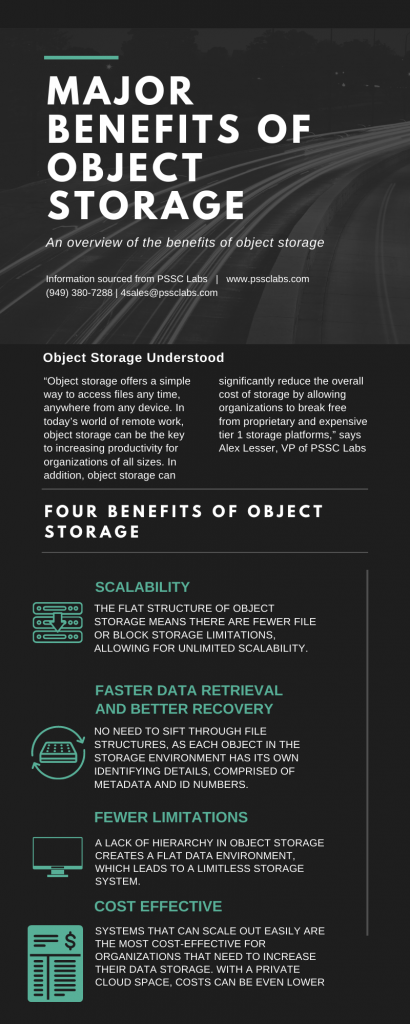It is difficult to pinpoint an exact definition of object storage since the concept has different meanings within different organizations. In its most basic explanation, object storage is a system that places your stored data on a flat plane called a “storage pool.” Unlike other storage systems, objects are not kept in a hierarchy and cannot be put inside one another. This is beneficial for a number of reasons.
“Object storage offers a simple way to access files any time, anywhere from any device. In today’s world of remote work, object storage can be the key to increasing productivity for organizations of all sizes. In addition, object storage can significantly reduce the overall cost of storage by allowing organizations to break free from proprietary and expensive tier 1 storage platforms,” says Alex Lesser, VP of PSSC Labs.
Object storage offers a simple way to access files any time, anywhere from any device. In today’s world of remote work, object storage can be the key to increasing productivity for organizations of all sizes. In addition, object storage can significantly reduce the overall cost of storage by allowing organizations to break free from proprietary and expensive tier 1 storage platforms.
4 Benefits of Object Storage
1. Scalability
Object storage is known for its compatibility with cloud computing, and that’s because of its unlimited scalability. Thanks to its flat structure, object storage doesn’t have the same limitations as file or block storage. Hierarchical systems often experience complications when it comes to scaling out. Those difficulties are avoided in an object storage environment because the system scales out by adding nodes. Object storage can easily scale data to petabytes without restrictions.
Though it has these advantages in scalability, it doesn’t mean object storage systems can’t also benefit static data. In fact, object-based storage is optimal for static data. For this reason, object storage has a sort of niche applications in the market, best serving static yet scalable archival storage, according to ComputerWeekly. For example, object storage could be ideal for digital archives.
2. Faster Data Retrieval and Better Recovery
Each object in the storage environment has its own identifying details, comprised of metadata and ID number, which the OS reads to retrieve data. Without the need to sift through file structures, retrieval is much faster. Thanks to the metadata and ID numbers, users don’t need to know an object’s exact location to retrieve it. TechTarget compares object storage to valet parking: you don’t know where your car is parked, or if and how many times it moves throughout the evening, but by having a receipt, you’ll be able to retrieve your car at the end of the night. Additionally, having unrestricted metadata allows storage administrators to implement their own policies for data preservation, retention, and deletion. This, along with the way storage nodes are distributed across the structure, makes it easier to reinforce data and create better disaster recovery strategies.
3. Fewer Limitations
Compared to the traditional file or block-based systems, object storage is far less limited because it’s not organized in a hierarchy. Object storage provides the kind of access that other storage systems can’t allow. TechTarget also points out that the metadata in file systems is limited to file attributes, whereas, in object storage, it can be customized by any number of data attributes. It’s only possible to achieve that in file systems through a separate application. In addition to these advantages, as well as its unrestricted scalability, this all contributes to a limitless storage system that files or blocks can’t provide.
4. Cost-effectiveness
For organizations that need to store large amounts of data, an object-based system could be the most cost-effective. Because it scales out much easier than other storage environments, it’s less costly to store all your data. Plus, if users have a private cloud space, costs can be even lower. When compared to other systems that are considered inexpensive for these volumes of data, it’s a much more durable alternative.
Learn More
To learn more about object storage and implications for your organization contact us at 4sales@pssclabs.com or 949-380-7288. For over 25 years PSSC Labs has been providing custom, on-premise high performance computing (HPC) systems designed to meet our clients’ unique enterprise computing challenges. So whether you need help with an HPC AI or Deep Learning solution or other Big Data application, PSSC Labs is here for you and your organization.
To download the infographic as a PDF, please click here.





